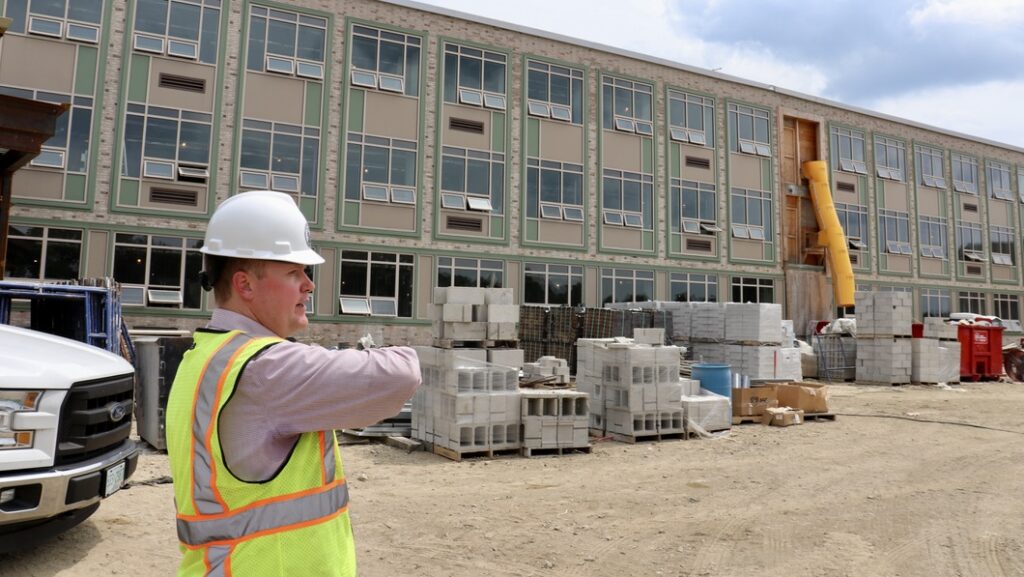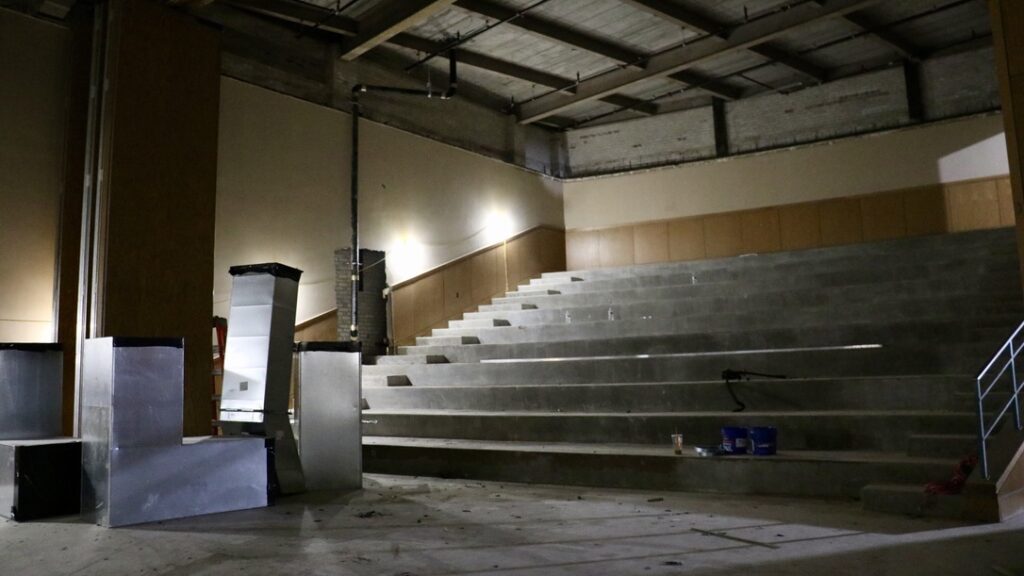Josh Morse is dwarfed by the skeleton of cinder blocks forming the shape of a gymnasium, as he walks through the construction site for Lincoln-Eliot Elementary School.
“Not only is this a great opportunity to build something special for the Lincoln-Eliot community, it’s an opportunity to create something special for the entire neighborhood,” he remarks over the din of saws as he points out the area of dirt that will become the soccer field.
The construction project for Lincoln-Eliot is massive and exciting, but for Morse, Newton’s public buildings commissioner, it’s far from his only focus.
Today, Newton is building more than it has since the baby boom, with $200 million of capital construction projects currently underway. These include the renovation or construction of seven schools, renovation at the police department and the reconstruction of a new senior center.
In other words, Morse is busy.
“I really do work hard,” Morse said. “But I love the opportunity.”
Morse’s workdays typically run from 4 a.m. to 10 p.m. His job includes visiting construction sites, meeting with residents, committees and commissions, and overseeing the operations of Newton’s 84 municipal buildings.
“There’s a lot happening,” Morse said.

From the sea to the saw
Before he worked for Newton, Morse served in the U.S. Navy for six years, working in nuclear engineering on submarines. He said he left in 2006 to find a less tumultuous career.
“Submarine life was very fun as a 20-something, but I was gone constantly,” Morse said. “We were all over the place, and I just wanted to be able to settle down.”
Though unconventional preparation for a city buildings manager, his military experience lent itself well to his current work, according to Morse.
“Much like buildings, [submarines] have all the same systems, electrical, mechanical ventilation, you know, heating, cooling,” Morse said. “So slightly different approach than some, but it actually transferred well.”
Much of Morse’s time is dedicated to the capital improvement plan, a biannually-updated proposal for investing city money in infrastructure. He said that he’s always updating the estimates for what his projects will cost.
“I’m constantly looking at existing conditions, updating our plan, adjusting costs based on market conditions,” Morse said.
But another other central element of Morse’s job is communication. He meets regularly with Newton’s 80 commissions, committees or advisory boards, the city’s government agencies run by residents. He’s required to give construction updates and take comments at many of these meetings, but often, he chooses to attend.
“At any given night, literally Monday through Thursday, 52 weeks a year, there are meetings going on that either I have to be at or that I want to be at,” Morse said.
And on top of his official capacity for communication, Morse also has an email newsletter with 10,000 recipients, as well as presence on Facebook, Instagram and Twitter.
“I want to make sure that residents have an opportunity to engage with me directly, not only to see how their tax dollars are being spent, but also an opportunity to ask questions,” Morse said.

Sometimes it’s the small things
Morse said he also tries to make himself a resource for residents in ways that don’t fit into his job description, applying his expertise to everything from traffic issues to rodent control.
“If a neighbor across the street has an issue with the sidewalk that has nothing to do with our project, I take that on,” Morse said.
These tasks are mostly a matter of providing information to residents and being available to talk, according to Morse.
“Simple things like being available and answering those questions, as opposed to just saying the number to call,” Morse said. “It’s something that helps a lot…it builds trust.”
At the construction site, Morse entered the empty, 410-seat auditorium in Aquinas Junior College. It’s cavernous and seems out of place for an elementary school, but Morse explains its significance.
This is one of many construction projects borne out of recommendations from community members. In planning the building, Morse said he met with 44 performance groups who convinced him to keep it as an auditorium for the whole city, to be used for local bands, TED talks and everything in between.
“A space like this is that opportunity to bring the community into one spot to be together,” Morse said.
Standing in the auditorium, surrounded by the construction he envisioned and saw built, Morse again turned his focus to what his job means at the micro level.
“I love doing huge projects, don’t get me wrong,” Morse said. “But those projects take years and years to complete. There is something about the instant gratification of helping somebody in just the day-to-day.”